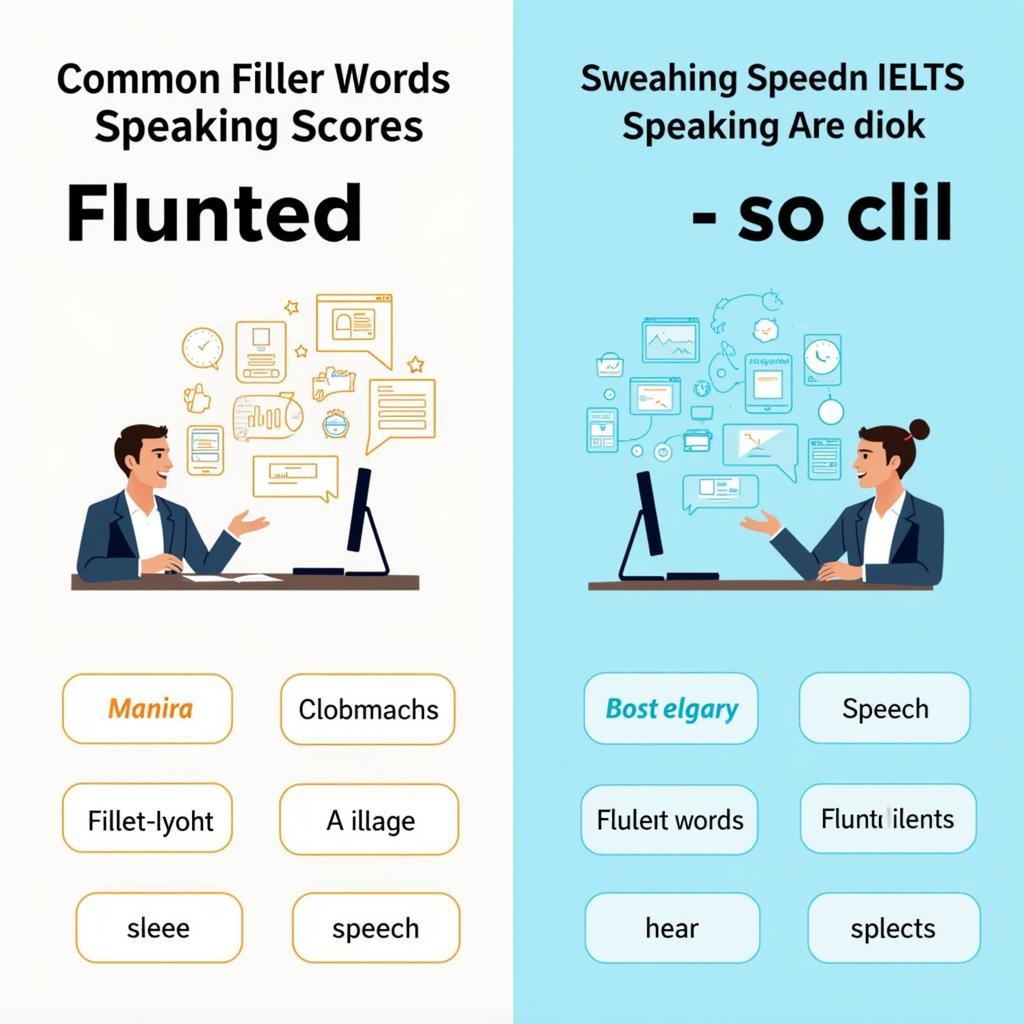When it comes to achieving a high score in IELTS Speaking, one of the most crucial skills is maintaining fluent speech without relying on filler words. Just as how to speak confidently under pressure is essential, eliminating unnecessary fillers can significantly enhance your speaking performance.
Understanding Filler Words and Their Impact
Filler words such as “um,” “uh,” “like,” “you know,” and “actually” can significantly impact your IELTS Speaking score, particularly in the fluency and coherence criterion. These verbal crutches often indicate uncertainty and can make your speech sound less professional and confident.

Common Filler Words to Avoid
Hesitation Markers
- Um/Uh
- Er/Ah
- Well (when used unnecessarily)
- You know
- Like
- Actually
- Sort of/Kind of
- I mean
Repetitive Phrases
- “I think that…”
- “To be honest…”
- “As I said before…”
- “What I’m trying to say is…”
Just as improving coherence in speaking answers is crucial, eliminating these filler words can make your responses more precise and impactful.
Effective Strategies to Eliminate Filler Words
-
Practice Conscious Pausing
Instead of using fillers, learn to embrace strategic silence. Dr. Sarah Thompson, IELTS Speaking Expert, notes: “A brief pause is always better than a filler word. It shows thoughtfulness rather than uncertainty.” -
Record and Analyze
- Record your practice sessions
- Count the number of filler words used
- Identify patterns and triggers
- Focus on problematic areas
- Use Transition Phrases
Replace fillers with proper transition words:
- “Moreover”
- “Furthermore”
- “In addition”
- “However”
- “On the other hand”
- Develop Pre-prepared Frameworks
Similar to handling rapid-fire questions in part 3, having ready-made response structures can reduce reliance on fillers.
Advanced Techniques for Natural Speech
Mental Preparation
- Organize thoughts before speaking
- Visualize key points
- Practice topic-specific vocabulary
- Focus on sentence endings
how to avoid hesitations in speaking provides additional strategies that complement these techniques.
Rhythm and Pacing
- Maintain steady speech rate
- Use natural intonation
- Include appropriate emphasis
- Practice breath control
Just as avoiding double negatives in speaking improves clarity, maintaining proper rhythm enhances overall fluency.
Practice Exercises
- Shadow Speaking
- Listen to native speakers
- Mimic their speech patterns
- Focus on natural pauses
- Practice intonation
- Topic Chain Exercise
- Choose random topics
- Speak for 2 minutes
- Switch topics smoothly
- Avoid fillers during transitions
Final Tips for Test Day
- Stay calm and composed
- Take brief pauses when needed
- Focus on clear pronunciation
- Use learned transition phrases
- Maintain eye contact with examiner
Remember, as Professor Michael Roberts, IELTS Speaking Examiner, emphasizes: “Confidence comes from preparation. The less you rely on filler words, the more professional and competent you sound.”
FAQ
Q: Are all pauses bad in IELTS Speaking?
A: No, strategic pauses are natural and can enhance your speech when used appropriately.
Q: How can I identify my filler word patterns?
A: Record yourself speaking and analyze the recordings, noting when and why you use fillers.
Q: Will I lose marks for occasional use of filler words?
A: Occasional fillers won’t significantly impact your score, but frequent use can affect your fluency rating.
Q: How long should I practice to reduce filler words?
A: Dedicate at least 15-20 minutes daily for 2-3 weeks to see significant improvement.
Q: What should I do if I catch myself using a filler word during the test?
A: Simply continue speaking naturally without drawing attention to the mistake.